AMBLE: Physical Activity, Motor Behavior & LEarning – Research – Department of Teacher Education
AMBLE: Physical Activity, Motor Behavior & LEarning
How can physical activity and motor behavior promote learning and development throughout life? With an interdisciplinary approach, AMBLE seeks to explore the processes that drive learning – both individually and collectively. Our goal is to develop evidence-based methods that strengthen teaching, health, and life skills across age groups.


About us
Research Aims and Scope
AMBLE is a multidisciplinary research group that aims to address the role of physical activity and motor behavior in the design of educational experiences that foster learning and development in a lifespan perspective. With a combination of psychological, biological and educational approaches, the focus of research is to understand underlying processes that drive individual and collective learning experiences, which in turn can inform the development of evidence-based practical applications in education. To this end, the AMBLE research group apply ecological frameworks as the basis for a rich variety of quantitative and qualitative research designs. This aim is operationalized in four interconnected focus areas.
Focus Areas:
- development of new and innovative research methodology, with interdisciplinary applicability for research, education and pedagogy
- life-span development and learning in aquatic environments, with special emphasis on the role of teacher education and primary/lower secondary school
- the significance of Motor Competence and Bodily Learning in Education
- public Health and Life Management across the lifespan, with focus on the contribution of teacher education and primary/lower secondary school in well-being, meaningfulness and health promotion
Research Strategy
International Strategies and Calls for Actions
AMBLE is focused on two Sustainable Development Goals from UN:
- Goal 3: Ensure healthy lives and promote well-being for all and all ages.
- Goal 4: Ensure inclusive and equitable quality education and promote lifelong learning opportunities for all. AMBLE is devoted to conducting research on the contribution of health, physical activity and motor behavior toward education in general, and in primary/secondary school and teacher education specifically.
With a special focus on learning and development in aquatic environments, AMBLEs activity responds to a call for action from WHO (2023) for a global investment case in drowning prevention. In this call, teaching school-age children basic swimming skills is considered a primary measure.
National Governmental Strategies and Calls for Actions
There is a call from the Norwegian government to focus research efforts on Health and Trust & Community as thematic priorities. In AMBLE, we consider that these topics need to be addressed together in the educational system, and that long-term goals of research are to understand how physical activity and motor behavior can be utilized as driving forces in creating educational contexts that are both promoting health, diversity, and participation for all.
The Norwegian government has also issued a call for a more practical and applied approach in primary and lower secondary school, to facilitate better learning, motivation and well-being. An integrated part of this call is to strengthen the practical and aesthetic subjects. The research activity in AMBER is aligned with this focus.
NTNU Teacher Education
Aligned with core strategies at the SU-Faculty, AMBER research group conduct research that addresses key societal challenges nationally and internationally (e.g., drowning prevention, and decline in motor competence, health promotion). AMBER is devoted to conducting research on the contribution of physical activity and motor behavior toward education in general, and in primary/secondary school and teacher education specifically. This research is of high relevance for Department of Teacher Education, as the strategic plan asserts that research should be practice- and profession-oriented. The aim of the work is to develop new knowledge about the underlying processes that drive individual and collective learning experiences, in which can inform research-based approaches in teaching and learning in school and other educational contexts. The research group also works actively toward establishing and promoting collaboration with educational stakeholders, including teachers, schools, municipalities and organizations with high actuality in the educational system.
Projects
- A Multifactorial and Ecological Approach to Understand Assessment, Grading and Achievement in Physical Education
- Autonomous motivation in physical education among younger children
- Discovery Learning and Motor Skill Acquisition in Team Handball
- Implementation of competence on adapted physical activity/physical exercise for students with disabilities
- The Learning Environment as an Educator
- The Developmental Journey Toward Aquatic Literacy in Children: A Longitudinal Study in a Physical Education Context
PhD projects
- Meaningful Physical Education in the Context of Outdoor Swimming in Lower Secondary School (scheduled for completion in 2026)
- Associations Between Pupil-Related Factors and Achievement in Physical Education (2024)
- Assessing Swimming Competence among Children in Physical Education, and Exploring Skill Transfer in Various Aquatic Environments (2024)
Overview of all publications in The Norwegian Research Information Repository (NVA)
Activities
15 September 2025: Physical Education Research Symposium (PDF)
- Water Competence: dosent Egil Galaaen Gjølme (leader), Department of Teacher education, NTNU Trondheim, Norway
- Sport and Human Movement Science (SaHMS). Professor Tore Kristian Aune (leader), Faculty of Education and Arts, Nord University, Levanger, Norway
Participants from NTNU
-
Øyvind Bjerke Associate Professor and Excellent Teaching Practitioner.
+4748010854 oyvind.bjerke@ntnu.no Department of Teacher Education -
Ingrid Østgaard Buaas Associate Professor in Physical Education
+4795158216 ingrid.o.buaas@ntnu.no Department of Teacher Education -
Ingrid Elnan PhD Candidate
+4795282416 ingrid.elnan@ntnu.no Department of Teacher Education -
Ruben Vist Hagen Associate Professor
ruben.v.hagen@ntnu.no Department of Teacher Education -
Stian Oldervik Assistant Professor
stian.oldervik@ntnu.no Department of Teacher Education -
Hermundur Sigmundsson Professor
+47-73590617 +4790886279 hermundur.sigmundsson@ntnu.no Department of Psychology -
Jon Sundan Associate Professor
+47-73412432 +4746791443 jon.sundan@ntnu.no Department of Teacher Education -
Vigdis Vedul-Kjelsås Associate Professor
+47-73558958 vigdis.vedul-kjelsas@ntnu.no Department of Teacher Education
Associated Researchers
- Lise Storli, PhD Candidate, Queen Maud University College, Trondheim, Norway
- Professor Keith Davids, School of Sport and Physical Activity, Sheffield Hallam University, UK
- Associate Professor Truls Valland Roaas, Faculty of Education and Arts, Nord University, Levanger, Norway
- Dosent Arve Vorland Pedersen, Department of Neuromedicine and Movement Science, NTNU Trondheim, Norway
- Professor Ellen Beate Hansen Sandseter, Queen Maud University College, Trondheim, Norway
